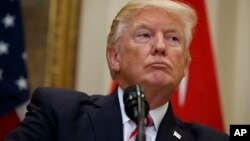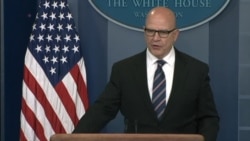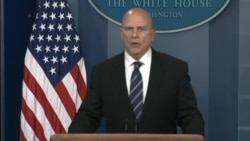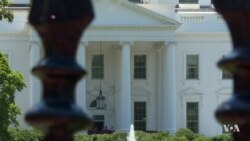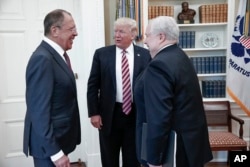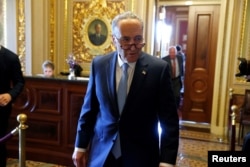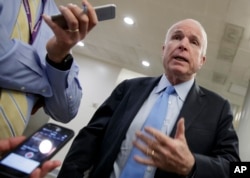U.S. National Security Adviser H.R. McMaster on Tuesday said information about terrorism and threats to international aviation that President Donald Trump shared with Russian diplomats last week was "wholly appropriate" and did not compromise U.S. intelligence sources.
McMaster stood by his earlier statement that the premise of U.S. news accounts was false that Trump had divulged highly classified information to Russian Foreign Minister Sergey Lavrov and Russian Ambassador to the U.S. Sergey Kislyak about a possible Islamic State plan to smuggle bombs hidden in laptop computers aboard airliners. The president met Lavrov and Kislyak behind closed doors in the Oval Office last week.
WATCH: McMaster on Whether Trump Shared Classified Info with Russians
"I'm not concerned at all," said McMaster, who said he was at the Oval Office meeting. "That conversation was wholly appropriate to the conversation, and I think wholly appropriate with the expectation of our intelligence partners.
"The president in no way compromised any sources," McMaster said.
The national security adviser also rejected news reports that Trump may have inadvertently divulged the source of the information. "The president wasn't even aware of where this information came from," said McMaster. "He wasn't briefed on the source or the method of the information either."
WATCH: McMaster on Whether President Knew Source of Shared Info
Israel reported as source
The New York Times reported Tuesday that the source of the information was Israel, one of America's closest allies in the region. That report has since been corroborated by diplomatic and intelligence sources.
In an off-camera briefing, White House spokesman Sean Spicer would not comment when asked if Israel was the source. But he did say the U.S. is pleased with "the strong relationship that we have with Israel, and appreciate the exchange of information that we have with them."
Israel's ambassador to the United States, Ron Dermer, also would not comment on the intelligence. But in a statement, he expressed satisfaction with his country's ties with the United States. "Israel has full confidence in our intelligence-sharing relationship with the United States, and looks forward to deepening that relationship in the years ahead under President Trump," Dermer said.
White House reaction
Spokesman Spicer said the White House is clearly irritated at the leaks that have dominated the news since the story was broken by The Washington Post. "The idea that someone who has been given access to information is pushing that information out to the media undermines our national security," he said. "And I don't think there is any other way to say it than it is, frankly, dangerous."
The spokesman argued that it was appropriate for Trump to discuss the subject of airline terrorism with Russian officials.
"Russia would be a logical partner in the fight against attacks on airliners, since it has also been a victim of a deadly airliner attack," Spicer told reporters. "There was information about a shared aviation threat. They had an airplane that was taken down in October 2015 in which 200 lives were lost. They shared in disgust a shared threat that our two countries have. I think that was extremely appropriate."
Trump made only indirect comments about the controversy Tuesday during an event with visiting Turkish Prime Minister Recep Tayyip Erdogan. "We had a very successful meeting with the foreign minister of Russia. Our fight is against ISIS," Trump said, using an acronym for Islamic State. "We want to get as many to help fight terrorism as possible."
Trump on Twitter
Earlier, Trump used Twitter to mount a defense of his "absolute right" to share information with the two Russian diplomats. He tweeted that he met with Lavrov and Kislyak to urge Russia to "greatly step up their fight" against Islamic State and terrorists.
Schumer calls for transcripts
As the controversy over Trump's remarks unfolded, Senate Minority Leader Chuck Schumer called for the White House to release a transcript of Trump's meeting with the Russian officials to lawmakers on congressional intelligence committees.
"If the reporting is accurate," Schumer said, "in one fell swoop, the president could have unsettled our allies, emboldened our adversaries, endangered our military and intelligence officers [the] world over, and exposed our nation to greater risk."
Republican Senator John McCain, a key foreign affairs expert, said Trump's disclosure risked the cooperation of allies in future intelligence gathering operations. "It's a serious concern and we have to know who it is he [Trump] may have unmasked [the intelligence source] by giving that information" to the Russian officials, McCain said.
A Russian Foreign Ministry spokeswoman on Tuesday denied that Trump revealed any classified information to Lavrov and Kislyak, calling the reports "fake."
Analysts disagree
Analysts noted that a U.S. president has the power to declassify nearly any information, so what Trump did does not appear to be illegal. But intelligence officials have expressed concern that the information, provided by a U.S. partner government, could harm crucial international relationships.
Several former CIA directors have spoken publicly, differing sharply in their opinions about the gravity of Trump's information sharing episode.
Leon Panetta, who headed the agency for two years under President Barack Obama, described Trump as a "loose cannon." Speaking on CNN, Panetta said the president "must come to terms with the idea that his words now have gravity as the leader of the free world."
James Woolsey, who was CIA chief in the Clinton administration, told VOA the president was within his rights to divulge classified information as long as he did not reveal where it came from or how it was gathered. "It depends entirely on whether the president and anybody with him disclosed sources and methods," Woolsey said. "They said they did not. Therefore, it's a nothing burger."
VOA’s Jeff Seldin, Katherine Gypson, Michael Bowman, Ken Bredemeier and William Gallo contributed to this report.




